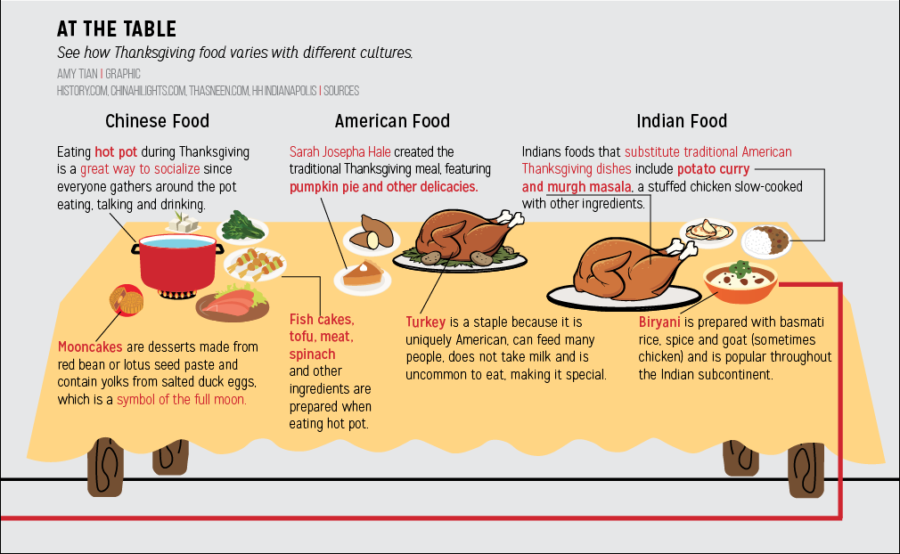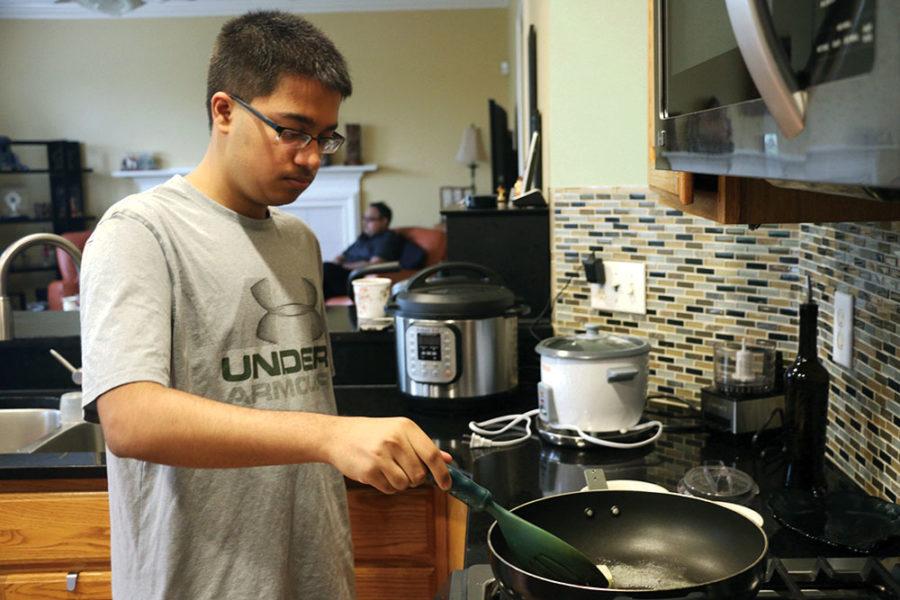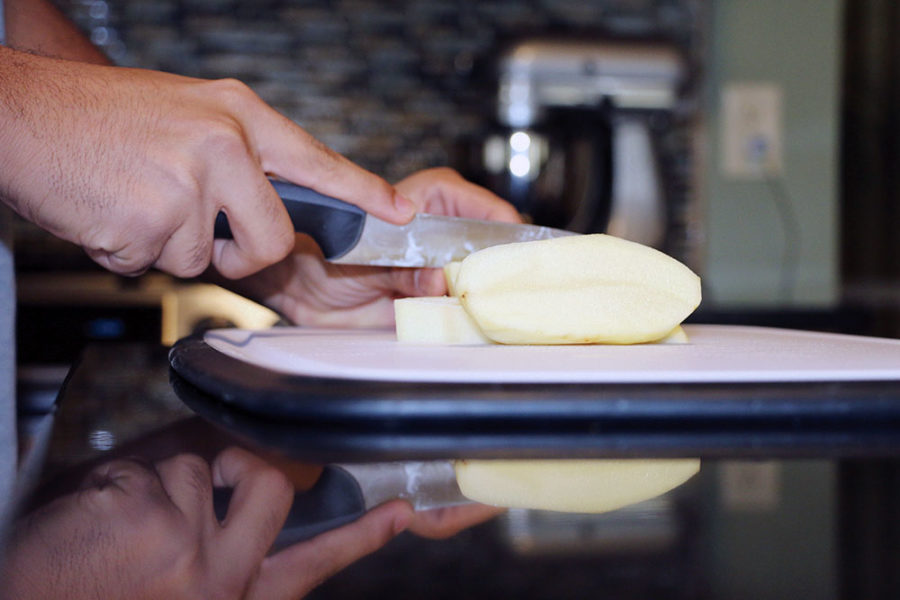When Thanksgiving comes to mind, turkey, mashed potatoes and football typically come to the forefront. For some students at this school, however, not all of these stereotypical elements are present. For senior Sathvik Madduri, Thanksgiving entails aspects not considered in an average Thanksgiving celebration due to his cultural background.
“I’d definitely say that my Thanksgivings are unlike most,” Madduri said. “A lot of that has to do with my Indian background and identity.”
 Madduri said while he and his family do celebrate Thanksgiving, they celebrate it slightly differently when it comes to food.
Madduri said while he and his family do celebrate Thanksgiving, they celebrate it slightly differently when it comes to food.
“We have things that are traditionally American Thanksgivings, but we like to put our own Indian twists,” Madduri said. “So, mashed potatoes would be potato curry for us, our Turkey would be seasoned with Indian spices and we would be watching Indian comedies instead of football.”
Madduri is not alone in celebrating culturally unique Thanksgivings; senior Joey Lee similarly said he celebrates Thanksgiving differently than most other students due to his cultural identity.
“Coming from a Chinese background, my Thanksgivings are usually much different than most other people,” Lee said.
Unlike Madduri, however, Lee said he and his family celebrate Thanksgiving in a way that does not take much influence from traditional American Thanksgiving food.
“As for food, my family and I usually eat a traditional Chinese meal called hot pot,” Lee said. “Fresh ingredients like seafood and vegetables are all boiled together in a broth and usually served with a raw egg and a sauce.”
English teacher Marie Satchivi also celebrates Thanksgiving differently than others due to her African identity.
“I am fortunate that every Thanksgiving we drive to Illinois to meet family friends. Instead of turkey, we usually have lamb or fish,” Satchivi said. “The lamb has a lot of Muslim and African influence. I grew up in a country where Muslims and Christians lived peacefully together, and so we know how to appreciate lambs for special events.”
Satchivi said this cultural diversity is crucial in Thanksgiving celebrations as it allows for a deeper connection between other cultures and further brings people together.
“The benefit of diversity is that it allows for you to connect with different cultures and makes you more knowledgeable and open-minded about these different cultures,” Satchivi said. “If students include cultural diversity and meals from other cultures, it will serve the main purpose of bringing people together.”
In addition to the differences between a stereotypical Thanksgiving celebration and his usual Thanksgiving celebration, Madduri said he celebrates with both his family and his friends.
“My family and I usually go to a family friend’s house and it’s basically a really big family-friend gathering,” Madduri said. “I know that most American Thanksgivings emphasize more on individual family-based gatherings rather than friend-based gatherings.”
Due to a lack of emphasis in family significance, Madduri said his Thanksgivings feel incomplete.
“The family aspect is not really emphasized at my family-friend gatherings during Thanksgiving,” Madduri said. “I usually hang out with my friends there and my parents hang out with theirs. It feels kind of weird to me because it’s not that family-oriented like a typical Thanksgiving is supposed to be.”
In a different outlook compared to Madduri, however, Lee said he feels his cultural twists for Thanksgiving still allows for a complete celebration.
“With my cultural identity’s influence, I still feel like my Thanksgivings are complete,” Lee said. “I still get to spend quality time with my family and can reflect on what I am thankful for.”
Nonetheless, Madduri said the little emphasis on family during his Thanksgivings do not prevent him from fully expressing his gratitude and thanks during the holiday.
“Even if my Thanksgivings aren’t so family-oriented,” Madduri said, “I still am regardless able to fully express what I am thankful for.” 

































![AI in films like "The Brutalist" is convenient, but shouldn’t take priority [opinion]](https://hilite.org/wp-content/uploads/2025/02/catherine-cover-1200x471.jpg)









































![Review: “The Immortal Soul Salvage Yard:” A criminally underrated poetry collection [MUSE]](https://hilite.org/wp-content/uploads/2025/03/71cju6TvqmL._AC_UF10001000_QL80_.jpg)
![Review: "Dog Man" is Unapologetically Chaotic [MUSE]](https://hilite.org/wp-content/uploads/2025/03/dogman-1200x700.jpg)
![Review: "Ne Zha 2": The WeChat family reunion I didn’t know I needed [MUSE]](https://hilite.org/wp-content/uploads/2025/03/unnamed-4.png)
![Review in Print: Maripaz Villar brings a delightfully unique style to the world of WEBTOON [MUSE]](https://hilite.org/wp-content/uploads/2023/12/maripazcover-1200x960.jpg)
![Review: “The Sword of Kaigen” is a masterpiece [MUSE]](https://hilite.org/wp-content/uploads/2023/11/Screenshot-2023-11-26-201051.png)
![Review: Gateron Oil Kings, great linear switches, okay price [MUSE]](https://hilite.org/wp-content/uploads/2023/11/Screenshot-2023-11-26-200553.png)
![Review: “A Haunting in Venice” is a significant improvement from other Agatha Christie adaptations [MUSE]](https://hilite.org/wp-content/uploads/2023/11/e7ee2938a6d422669771bce6d8088521.jpg)
![Review: A Thanksgiving story from elementary school, still just as interesting [MUSE]](https://hilite.org/wp-content/uploads/2023/11/Screenshot-2023-11-26-195514-987x1200.png)
![Review: "When I Fly Towards You", cute, uplifting youth drama [MUSE]](https://hilite.org/wp-content/uploads/2023/09/When-I-Fly-Towards-You-Chinese-drama.png)
![Postcards from Muse: Hawaii Travel Diary [MUSE]](https://hilite.org/wp-content/uploads/2023/09/My-project-1-1200x1200.jpg)
![Review: "Ladybug & Cat Noir: The Movie," departure from original show [MUSE]](https://hilite.org/wp-content/uploads/2023/09/Ladybug__Cat_Noir_-_The_Movie_poster.jpg)
![Review in Print: "Hidden Love" is the cute, uplifting drama everyone needs [MUSE]](https://hilite.org/wp-content/uploads/2023/09/hiddenlovecover-e1693597208225-1030x1200.png)
![Review in Print: "Heartstopper" is the heartwarming queer romance we all need [MUSE]](https://hilite.org/wp-content/uploads/2023/08/museheartstoppercover-1200x654.png)





